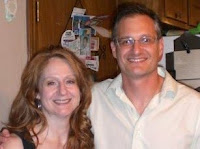I spent the last two school years as the PTA President at my children's elementary school. I am not a natural born leader, I am not a traditionally organized person and I kind of inherited the job in an unexpected way, not because I was just dying to be in charge of the PTA. I quickly learned a lot about human nature and I treasure the invaluable lessons I have learned along the way.
One of the main things we have to do as a PTA President is to make as many people as we possibly can happy. This often means setting aside our own agenda for the greater good of the group. Admittedly that is a tall order. What it basically means is that as President we have tons of responsibility, some influence, but very little power. Someone seeking a power trip will need to keep seeking rather than sign on as President of a PTA - there is no power in it. It is a position of service and altruism.
It is best to remind ourselves often that we do have some influence, but last word decisions will not be made by us. There are administrators and school boards and parents and teachers and all sorts of people in a position to make decisions. It is the PTA President's job to work as closely as possible with these powers than be and help each of them to get as much of what they want as possible to keep them content. There will be times when a loud squeaky wheel will demand that things go according to their own personal plan. If that squeaky wheel is the school board or an administrator (someone with true authority), you will often have to simply accept their edicts and work on making the best of the situation. It does no good to antagonize those people. We will continue to work closely with them and having a pleasant rapport with them is paramount.
I have found that many adults have not grasped the 'life is not always fair' mantra as well as they probably should have and have encountered many a parent who feels that they should have what they want out of the organization. This causes some to develop an adversarial attitude with the people who really hold power in these types of situations. We then make the mistake of feeling that the decisions that are being made are somehow personal to us and become very hard to work with, like a petulant child who has not gotten his way. This is never a good idea. I have found that a little flexibility goes a long way in evening out the playing field and getting more of what we want out of the people who make the ultimate decisions. They come to trust our even-handedness and really want to appease us.
Flexibility and diplomacy. Those are the two most effective tools in the PTA President's toolkit. Preconceived notions and stubborn rigidity need to be checked at the door - they will not gain us anything in the way of achieving our goal of a harmonious unit. If one message is passed along it should be this - It's not about you. There are so many decisions to be made, so many egos to be massaged, so many land mines to maneuver around; our job is to successfully lead the way toward compromise. When all is said and done, we have to remember that the bigger picture is the children we serve. If they are not the beneficiary of our plan, then our plan is a fail no matter how successful it looks on the outside.
I tried to impart during my two year tenure the message that getting what you want is not necessarily a victory if you had to step all over those whom you are ultimately serving in order to win. In some ways I can see that I was successful in my mission; nothing is ever 100% a success, though.
In addition I see that that these lessons should spill over into all parts of our lives and in other relationships as well. Looking at the big picture is always a good strategy, as is remembering who we are trying to benefit. Reminding ourselves periodically - It's not all about me is just a good idea no matter what our endeavor. Getting out of the way and letting things work for the greater good is just a good life lesson, as well as a great way to run a PTA.
Friday, August 7, 2009
Subscribe to:
Posts (Atom)













